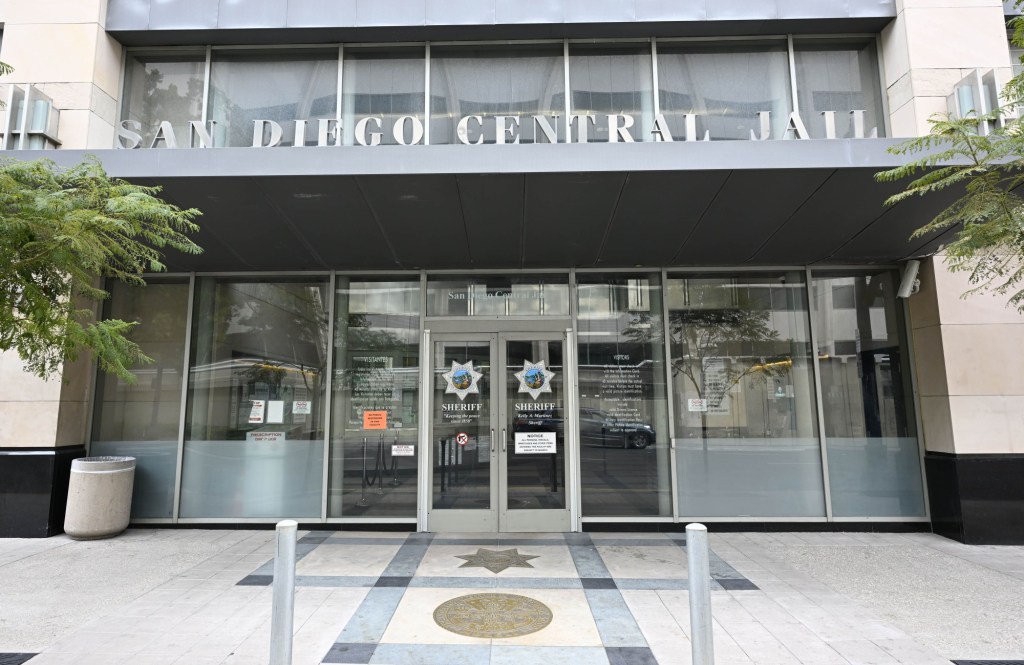

A three-judge panel of the 9th U.S. Circuit Court of Appeals has overturned a ruling by a San Diego federal judge from two years ago that ordered Sheriff Kelly Martinez to release internal records in the case of a man who was gravely injured in county jail.
The opinion, which was issued late last month but not formally unsealed until Monday, came in a 2-1 decision, with the dissenting judge saying the material in dispute clearly should be made available to the public.
It also reversed a 2023 decision from U.S. District Court Judge Jinsook Ohta, who said the public has an interest in learning what was behind Frankie Greer’s life-threatening injuries inside Central Jail.
Attorneys for the County of San Diego have argued that reports produced by the sheriff’s Critical Incident Review Board, or CIRB, are protected by attorney-client privilege because of the presence of the sheriff’s lawyer at review board meetings.
“The district court ruled that the documents are not protected from disclosure by the attorney-client privilege or under the work product doctrine,” the judges wrote. “We hold that the attorney-client privilege protects the CIRB documents at issue here and, therefore, reverse.”
The sheriff on Monday referred questions to the County Counsel’s Office, which defends the county in civil lawsuits. A spokesperson said the county appreciates the 9th Circuit decision.
“The court’s analysis correctly identified the longstanding principle behind the attorney-client privilege,” spokesperson Tammy Glenn said in a statement.
“While the county is committed to transparency of public information, we recognize that all are entitled to consult with their attorneys and expect those communications to remain confidential,” she said. “The San Diego Sheriff’s Office routinely release information to the public on its website and other channels.”
Lawyers representing The San Diego Union-Tribune and other news organizations said the majority opinion lays out a blueprint that would allow the sheriff and other government officials to withhold records from the public going forward.
“Given the clear split among the judges, the importance of the issues, and the uncertainty the decision creates, we believe the case would benefit from examination by additional 9th Circuit judges,” said Timothy Blood, one of the San Diego attorneys who co-represented the news outlets.
CIRB is made up of senior commanders who consider potential changes to sheriff’s policy or training in the aftermath of incidents that result in injuries or deaths.
After San Diego County agreed to pay Greer almost $8 million, the Union-Tribune requested the CIRB records related to the case.
More specifically, Greer’s lawyers received copies of CIRB reports related to 12 in-custody deaths as part of the legal process known as discovery. But the documents were kept under seal and not made available for public inspection.
The Union-Tribune sought the records because San Diego County has had one of the highest rates of in-custody deaths among California’s large counties.
The county also has paid tens of millions of dollars in legal settlements to the families of people who died in jail and to other people like Greer who suffered life-altering injuries while in custody.
Martinez refused to release the documents publicly after the Greer lawsuit had settled, so the Union-Tribune, Prison Legal News and Voice of San Diego asked the federal court to order the agency to turn them over.
Ohta ruled in 2023 that the sheriff must release the requested records.
“There are valid and compelling reasons for the public to be informed about conditions inside the county jails,” the judge said. “The public has an interest in those documents.”
San Diego County appealed that decision hours before the documents were scheduled to be released. The 9th Circuit granted the county’s request for a stay of the release order while the ruling was under review.
The majority opinion rejected Ohta’s finding that the CIRB reports were not protected by attorney-client privilege. The two judges said one of the primary purposes of the internal review board was to limit the sheriff’s legal liability.
“When something goes terribly wrong at a jail — such as a non-natural in-custody death or a serious injury — the jail reasonably expects a lawsuit, such as the one here, to follow,” they wrote, referring to Greer’s lawsuit.
“Investigation — that is, discovering what happened — is a necessary predicate to assessing liability for that past event and thus is not separate from the provision of legal advice,” they added.
Judge Lucy H. Koh disagreed. In a 22-page dissent, she said county lawyers had not established that the main purpose of CIRB was to shield the sheriff from legal liability. She said there was “ample evidence” to the contrary, including the sheriff’s own policy manual, statements by county officials and the CIRB reports themselves.
Koh also said county lawyers never identified everyone who received copies of the disputed reports and those who attended CIRB meetings. As a result, she said, the county had effectively waived its attorney-client privilege.
“Even assuming the privilege had been properly asserted, the county has offered no compelling explanation as to why the entirety of the CIRB reports must be withheld,” Koh wrote. “Those reports contain much information that is indisputably not privileged. At the very least, that information should be disclosed.”
Greer, a U.S. Army veteran who was a musician and artist, was arrested in 2018. He was assigned to the top of three bunks inside the Central Jail even though he had a diagnosed seizure disorder.
Sheriff’s deputies had confiscated his medication and failed to provide a suitable alternative, his civil lawsuit said. Greer later experienced a seizure and fell from the bunk, suffering a critical brain injury.
The 12 CIRB reports sought by the Union-Tribune involved unrelated cases involving people who died in San Diego County jails. Greer’s lawyers used the records to help show what they called the county’s ongoing disregard for the health and well-being of people in custody.
Danielle Pena, an attorney who did not work on the Greer case but has represented families of multiple people who have died in San Diego County custody, said releasing CIRB reports is in the public interest.
“It would lead to comprehensive reform and accountability,” she said.
When Martinez was campaigning for sheriff in 2022, she pledged to make CIRB reports public, but she changed her stance after winning the election and has released little more than summaries of in-custody deaths.
A bill signed into law in 2023 requires California sheriffs to release internal jail-death records. Martinez has begun to release some records under that law, but gaps in what her office has so far made available raise questions about whether it is fully complying.





